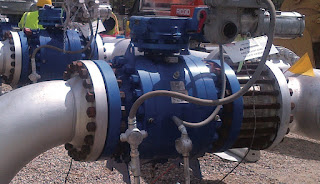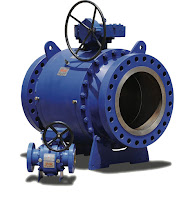 |
| WOM trunnion mounted ball valves in service. |
 |
| The only trunnion mounted ball valve with two independent seats. |
the secondary seat.
WOM’s Dual Seal Ball Valve typically comes with two seats upstream and two seats downstream of the ball. But it can be configured to have the outer seat on the downstream side modified to act as a Third seal. The third seal will provide one more seal on the downstream side of the valve. The valve is still bi-direction, even with the third seal option.
 The Dual-Seal was designed specifically so that it could not trap pressure in the body cavity. This is critical in hazardous liquids service, where thermal expansion can cause pressure build-up inside the body. The Dual -Seal will automatically self-relieve to the low pressure side of the valve. However, if the third seal is installed, it forces the valve to self-relieve to the upstream side. You are in control of the direction that the self-relieving seats vent to.
The Dual-Seal was designed specifically so that it could not trap pressure in the body cavity. This is critical in hazardous liquids service, where thermal expansion can cause pressure build-up inside the body. The Dual -Seal will automatically self-relieve to the low pressure side of the valve. However, if the third seal is installed, it forces the valve to self-relieve to the upstream side. You are in control of the direction that the self-relieving seats vent to.Redundant sealing technology, the third seal, and being able to control the direction of the thermal expansion pressure makes the Dual-Seal ball valve unsurpassed in real life performance. This combination of seats gives you a valve that will outlast typical ball or gate valves. It will lower your operational costs, add safety, and increase reliability.
For more infomration on WOM trunnion mount ball valves, contact Swanson Flo. Call them at 800-288-7926 of visit https://swansonflo.com.


